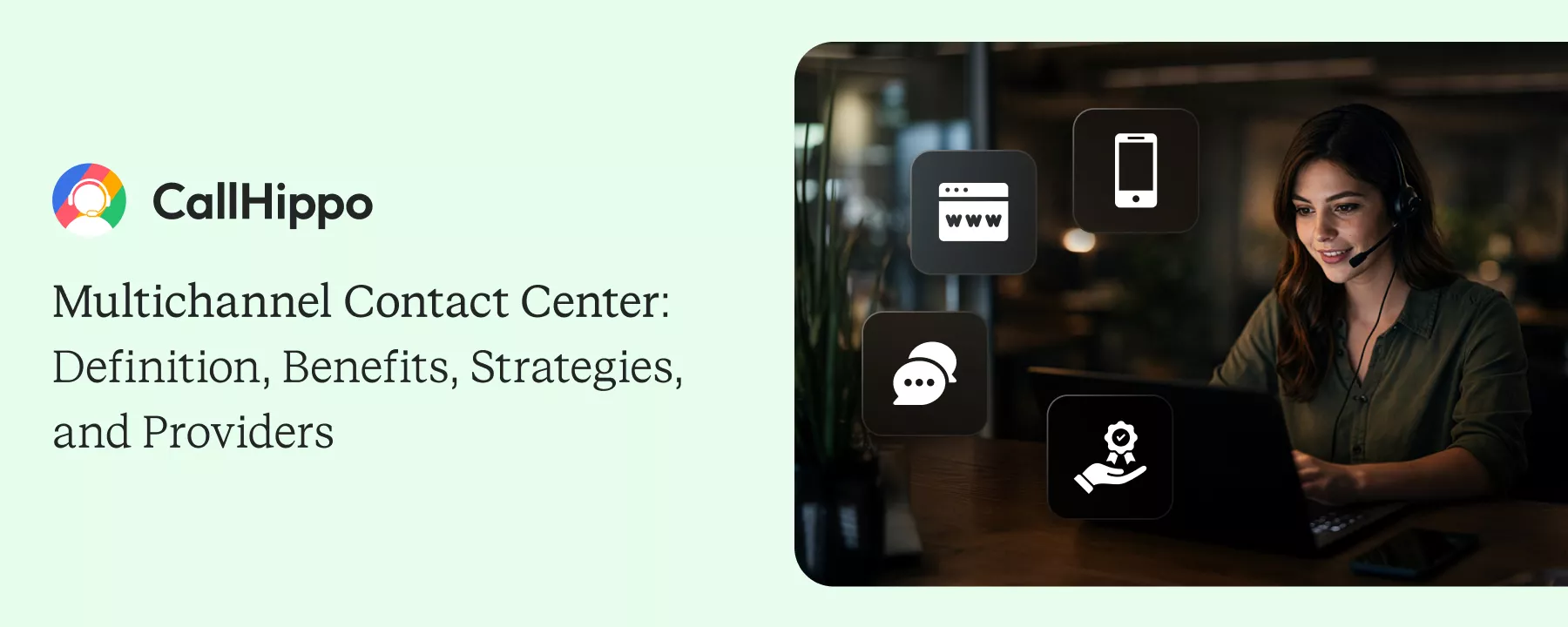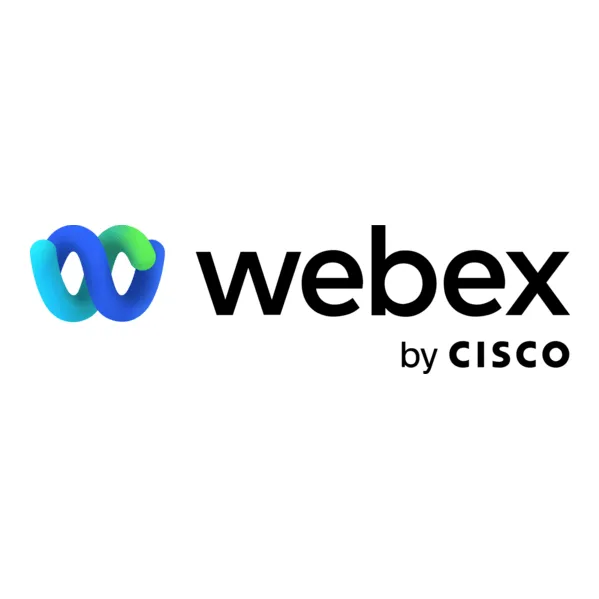A multichannel contact center is an indispensable part of an evolving business. It allows you to seamlessly interact with customers on multiple touchpoints and improve customer engagement and satisfaction.
At a time when 76% of customers turn to competitors after just 1+ bad experiences, you cannot afford to ignore the importance of serving your customers across channels. That’s what a multichannel contact center facilitates.
Here’s a guide on the multichannel contact center, its key components, types of channels, strategies to manage it, its benefits and limitations, and the top 6 multichannel contact center providers.
What is a Multichannel Contact Center?
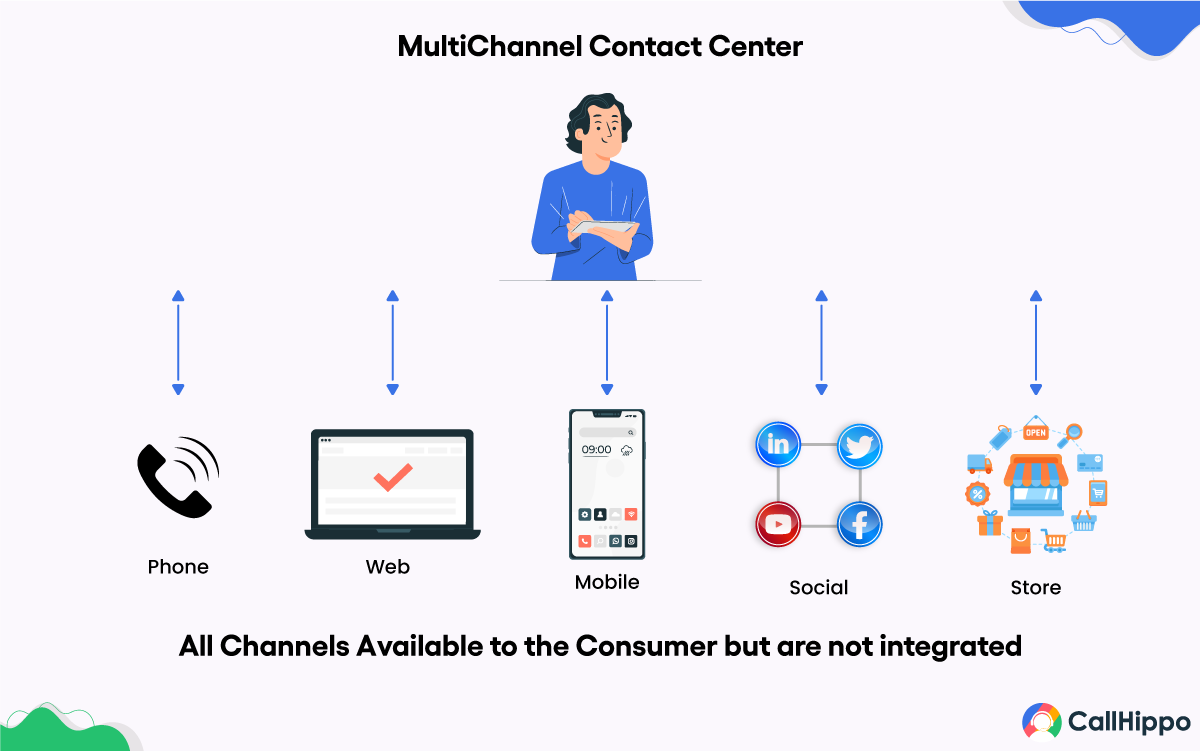
Multichannel contact center is a contact center software that allows you to extend seamless multichannel customer service via different communication channels IVR, SMS, Email, and web chat from a single platform. This improves your agent’s efficiency and helps them deliver better support.
From sending real-time SMS to accessing customer journey histories and automating workflows, a multichannel contact center can do it all and more. The results? Improved customer relationships, high customer engagement, and boosted retention.
Don’t confuse a multichannel contact center with a call center.
"An ideal multichannel contact center empowers you to have fruitful interactions with customers across multiple channels and build lasting customer relationships. But not all contact centers will match your business needs. So, choose the one that is highly functional and aligns with your specific requirements. Apply our listed strategies to manage it perfectly. "
Top 6 Multi-Channel Contact Center Providers
After extensive research, we have found the top multi-channel contact center providers for you. Let’s take a look:
| Provider | Best For | Free Trial | Starting Price | ||
|---|---|---|---|---|---|
| 1 | CallHippo | Mid-sized, large, and enterprise businesses that want an easy-to-use, affordable multi-channel contact center | 10-day free trial | $1/user/month | Explore More |
| 2 | Genesys Cloud | Large enterprises managing complex, high-volume omnichannel interactions | Free trial available (demo-based) | Contact sales | Explore More |
| 3 | Five9 | Businesses that need strong CRM integrations and compliance-ready contact center tools | No free trial (demo only) | $119/user/month | Explore More |
| 4 | NICE CXone | Enterprises that require advanced customization, workforce optimization, and analytics | 60-day free trial | $110/agent/month | Explore More |
| 5 | Cisco Webex | Organizations already using Cisco products and needing enterprise-grade security and reliability | Free trial available | Contact sales | Explore More |
| 6 | Twilio Flex | Tech-driven teams that want deep customization and have developer resources | Free trial with 5,000 active user hours | $1/hour or $150/user/month | Explore More |
1. CallHippo
CallHippo is an integrated, cloud-based contact centre that provides multiple communication channels (voice, SMS, and collaboration) in a single, easy-to-use interface. It has several AI-powered features. It’s easy to set up without requiring any special technical skills to use it. You can try CallHippo for 10 days free before committing to a subscription.
Features
- Smart Call Routing
- AI Voice Agent
- Real-Time Analytics
- Power Dialer
- Multi-Level Auto Attendant
Pros
- CallHippo offers 99.5% uptime, which is reassuring when customer calls are your lifeline.
- Shared inbox helps team members resolve queries from different channels from a unified dashboard.
- The pricing of CallHippo is transparent and helps you scale as you grow.
Cons
- Support can be slow during busy times, which is frustrating when you need help.
- That 10-day trial feels short compared to others offering two weeks or a month.
Pricing
- Basic: $1 per user/month
- Starter: $19 per user/month
- Professional: $29 per user/month
- Ultimate: $45 per user/month
- Enterprise: Contact sales
*Pricing as on 06/01/2026

Start with one that is simple to set up, easy to use, and priced for growing teams
Take a 10-Day Free Trial No credit card is required!2. Genesys Cloud
Genesys Cloud is a sophisticated enterprise multi-channel contact center solution that enables organisations to manage complex customer interactions effectively across multiple channels. With real-time tracking, businesses can gain insights into all customer activity across all channels.
Features
- AI-Powered Routing
- Omnichannel Engagement
- Workforce Engagement Management
- Real-Time Analytics
- Speech and Text Analytics
Pros
- Security is good with encryption, multi-factor auth, etc.
- They roll out updates weekly, so the platform keeps getting better
- If you’re technical, the API options are extensive for custom integrations
Cons
- It’s expensive. Small businesses will struggle with the price tag
- Some users report that the system crashes during updates
Pricing
Please connect with the vendor for pricing.
*Pricing as on 06/01/2026
3. Five9
Five9 provides practical AI applications to improve the performance of multi-channel contact centres. The Five9 platform uses automation to enhance agent performance and the customer experience. Features include intelligent routing to anticipate customers’ needs and real-time assistance for agents during calls.
Features
- Intelligent Virtual Agent
- Agent Assist
- Predictive Dialer
- Omnichannel Campaigns
- Workflow Automation
Pros
- CRM integrations work smoothly, and call logs are automatically updated
- The visual IVR designer is surprisingly easy to use without technical help
- Strong compliance features if you’re in a regulated industry
Cons
- Call quality can be spotty. Some users mention lag and dropped connections
- There’s a learning curve. Lots of features mean lots of configuration options
Pricing
- Digital: $119/user/month
- Core: $159/user/month
- Plus: contact sales
- Pro: contact sales
- Enterprise: contact sales
*Pricing as on 06/01/2026
4. NICE CXone
NICE CXone is an integrated, comprehensive cloud contact centre solution that offers a full suite of customer engagement solutions, such as workforce optimisation and analytics, all housed within one platform. CXone combines the contact centre’s many different functions and solutions into one platform, eliminating the need for multiple independent vendor-sourced applications; as a result, CXone is an all-encompassing solution built upon years of industry knowledge and experience.
Features
- DEPaaS
- Enlighten AI
- Integrated Workforce Management
- Studio Script Designer
- Personal Connection
Pros
- Highly customizable if you have specific workflow needs
- Huge partner ecosystem means pre-built integrations with hundreds of apps
- Workforce optimization features genuinely help control labor costs
Cons
- Pricing structure is complicated, and it’s hard to predict what you’ll actually pay.
- Login issues pop up more often than they should, disrupting agent productivity.
Pricing
- CXone Mpower Omnichannel Suite: $110/agent/month
- CXone Mpower Essential Suite: $135/agent/month
- CXone Mpower Core Suite: $169/agent/month
- CXone Mpower Complete Suite: $209/agent/month
- CXone Mpower Ultimate Suite: $249/agent/month
*Pricing as on 06/01/2026
5. Cisco Webex
Cisco Webex Contact Center is built on the power of Cisco’s global cloud infrastructure. It provides enterprise-level reliability and features to help organisations leverage that power for mid-market companies. Additionally, by integrating Cisco Webex Meetings and Webex Teams into the Webex portfolio of products, Webex Contact Center enables organisations already utilising Webex collaboration and meeting products to complement their contact centre experience.
Features
- Webex Calling Integration
- AI-Powered Virtual Agent
- Skills-Based Routing
- Desktop Analytics
- Digital Channels Integration
Pros
- Enterprise security and compliance that meets strict requirements
- Infrastructure is rock-solid with consistent performance globally
- If you’re already a Cisco shop, integration is straightforward
Cons
- No public pricing means you’re going through sales to find out costs
- Implementation typically needs professional services, which adds expense
Pricing
Please connect with the vendor for pricing.
*Pricing as on 06/01/2026
6. Twilio Flex
Twilio Flex is a programmable contact center that can be tailored to your specific needs; this allows developers to customize the solutionto your company’s unique workflow and technical requirements. If you have developers available, Twilio Flex offers numerous APIs that provide virtually unlimited customization options.
Features
- Programmable Agent Desktop
- Flex Insights Analytics
- TaskRouter
- Twilio Conversations API
- Programmable Voice and Video
Pros
- Unlimited customization if you have the development resources
- Usage-based pricing means you only pay for what you use
- The developer community and documentation are extensive
Cons
- Requires technical expertise for implementation and maintenance
- Total cost can be hard to predict with usage-based pricing
Pricing
- Per-hour pricing: starting at $1
- Per-user pricing: starting at $150
*Pricing as on 06/01/2026
Benefits of Multichannel Contact Center
Multichannel contact center enables you to entertain customer inquiries on the channel of their choice. But wait, there’s more to it. Here are the benefits of a Multichannel Contact center:
1. In-depth customer interaction insights
A contact center software platform can give you insights into customer interactions across multiple support channels in a single place live chat, social media, calls, and so on.
Agents can instantly access customer-specific information previous interactions, behavior, and likes to provide tailored support.
Also, when customers can access multiple support channels to reach out, the chances of issue resolutions are higher, improving their satisfaction and engagement.
2. Enhanced contact center performance
Want to ace customer relationships and have better customer retention without an increased physical infrastructure? Well, constantly monitoring and improving the contact center performance can help. Leverage the contact center’s single dashboard that furnishes customer behavior, preferences, analytics, and reporting on its overall performance.
Not just that, the contact center enables you to:
- Live track agent-customer conversations
- Gauge customer sentiments
- Review/improve agent’s performance
This can help you optimize your services/products/marketing to better satisfy your customers and boost profits.
3. Improved productivity and performance
An efficient multi-channel contact center is built to reduce the agent’s workload without compromising customer service, increasing business efficiency.
- The AI support feature can automate repetitive tasks and auto-answer general complaints.
- Workforce management tools can auto-generate agents’ schedules that are customizable to their requirements.
- The shift bidding feature can help agents exchange shifts with other agents.
4. Improved customer service and brand image
A multi-channel contact center helps you monitor customer behavior, spot any sentiment changes, and take immediate action. It’s critical as 89% of consumers will repurchase from a brand that offers positive customer service.
Not just that, the multichannel contact center has Interactive Voice Response with skill-based routing, so the customer is always handled by an agent best at solving that specific query.
All of this significantly enhances customer service. And when your customers trust you and keep returning to you, your brand image is bound to improve.
Key Components of Multichannel Contact Center
Remember, your multichannel contact center is only as robust as its components. When each component is efficient, your multichannel contact center inevitably drives desired results such as high customer satisfaction and engagement, customer loyalty, and agent productivity.
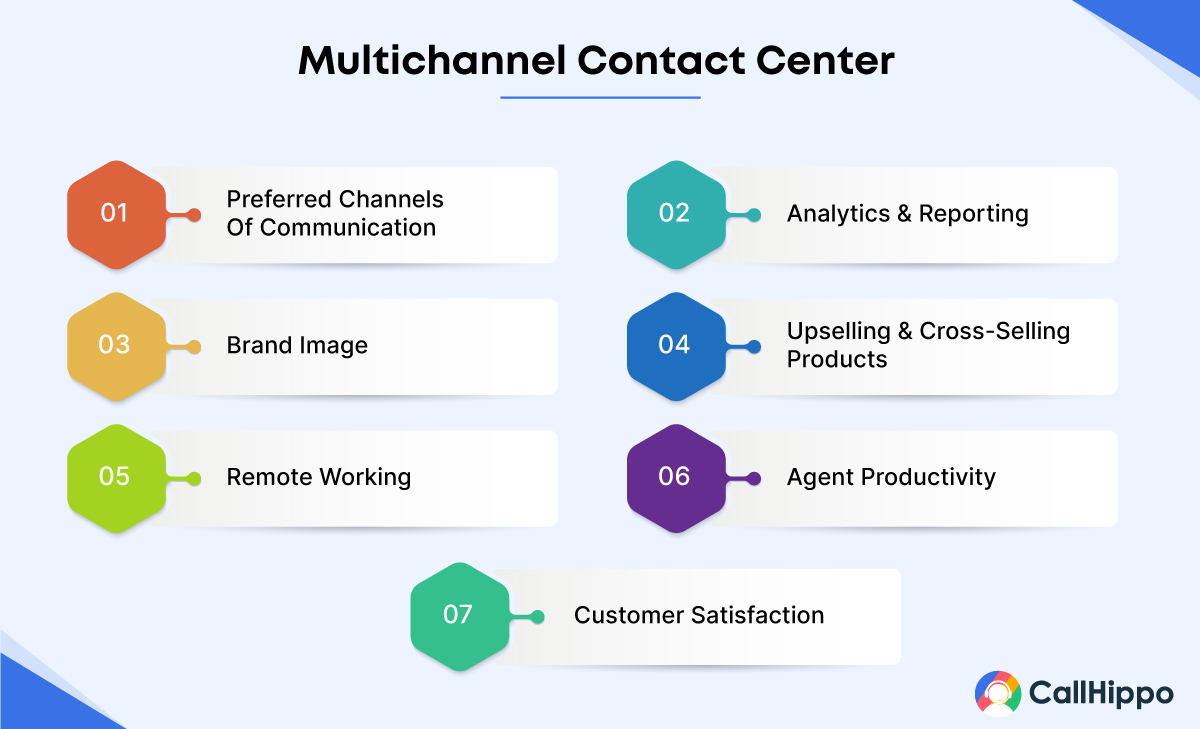
Let’s thus look at the top 7 components that make a multichannel contact center:
1. Automatic call distribution to distribute calls based on agents’ skills/availability or predefined routing rules to best resolve queries.
2. Multiple communication channels voice calls, email, web chat, video call, and more- allow customers to choose the one that suits them.
3. Agent multichannel dashboard to view customer interactions across channels. It can integrate with third-party apps UCaaS platforms, communication platforms, and CRM for a deeper view.
4. Analytics, reporting, and monitoring tools to monitor multichannel contact center agents’ and centers’ functioning. It also creates reports on agents’ performance, support quality, center usage, etc.
5. Self-service option includes IVR and a knowledge base. This allows customers to solve their problems using IVR voice commands or via FAQs/product information/other resources provided in the knowledge base.
6. Quality assurance features to monitor and improve agents’ performance and incorporate customer feedback to enhance service.
7. AI and automation to automate repetitive agent functions and workflow automation/optimization. For instance, the contact center automatically creates agents’ schedules after considering the center’s demand and the agent’s availability.
Multi-Channel Contact Center Metrics to Track
Getting the right multi-channel contact center solutions is step one. Step two is actually tracking whether it’s working. These metrics give you visibility into how your contact center is performing and where improvements will make the biggest difference.
Modern multi-channel contact center software automatically captures all this data, which is convenient. But you still need to understand which metrics actually matter and how to use the information they provide.
1. First Response Time
First Response Time (FRT) measures how quickly customers receive an initial response to their inquiry, whether via phone, email, chat, or social media. As customers get used to instant everything, this metric has become increasingly critical.
For phone calls in your multi-channel call center, FRT tracks queue time before an agent answers. For digital channels like email or chat, it’s the gap between when customers send their messages and when agents first respond.
- AFRT = (Total Time for First Responses) / (Total Number of Tickets)
2. Customer Satisfaction (CSAT)
Customer Satisfaction (CSAT) matters most, as it directly measures how well you’re meeting expectations. CSAT typically uses a simple survey asking customers to rate their satisfaction with the interaction, usually on a 1-5 or 1-10 scale.
Modern multi-channel contact center solutions automate CSAT collection across all channels. Post-call IVR surveys capture voice feedback. Automated email or SMS surveys gather responses for digital interactions.
- (Number of Satisfied Customers / Total Number of Survey Respondents) x 100
3. Average Handling Time Across Channels
Average Handling Time (AHT) measures the total time spent resolving a customer inquiry from initial contact through hold time, conversation, and after-call work. In a multi-channel call center, AHT varies significantly by channel. Chat and email typically take longer than voice calls due to multitasking and asynchronous communication.
Your multi-channel contact center software should track AHT separately for each channel and segment it by interaction type. Simple password resets should have much lower AHT than complex technical troubleshooting.
- AHT= Total Talk Time+Total Hold Time + Total After-Call Work Time (ACW) / Total Number of Calls Handled:
4. Channel Usage and Performance Insights
Understanding how customers prefer engaging with your business across channels is essential for resource allocation and strategic planning. Channel usage metrics reveal which communication methods customers choose for different issues, how preferences evolve, and where investment in multi-channel contact center solutions delivers the best returns.
Your multi-channel contact center software should provide comprehensive channel analytics, volume trends, peak usage periods, resolution rates, and satisfaction scores for each channel. This multi-dimensional view reveals not just which channels are most popular, but which are most effective for different scenarios.
Channel performance insights also identify opportunities for deflection and self-service. If your phone channel is overloaded with simple questions that could be answered through chat or FAQs, you’re wasting agent time and making customers wait unnecessarily for straightforward information.
Types of Channels in Multichannel Contact Center:
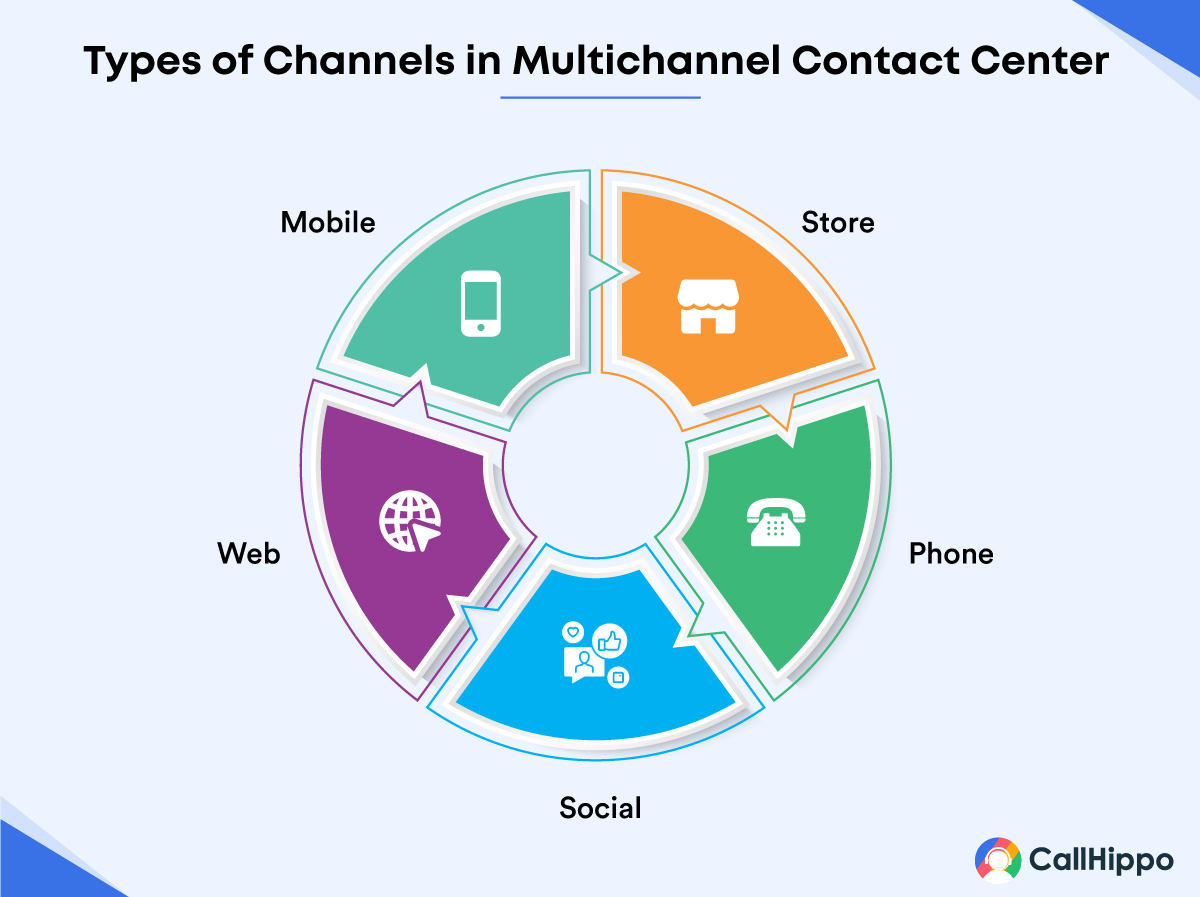
Here are the types of channels in a typical multichannel contact center that facilitate multichannel communication.
1. Phone calls
Phone calls are one of the basic digital channels that almost all multichannel contact centers must include. Phone support offers a quick, hassle-free solution through automated and live agent responses.
2. Email
Customers prefer email as a communication tool as it requires relatively low effort, minimal engagement, and can work with an average internet connection. Also, sending automated emails – bulk emails, password verification, service promotion, etc.- saves you time.
3. SMS text message
SMS text messages help you quickly update customers on urgent updates without wasting time scheduling a call. Incorporate automated triggers – live order updates, order confirmation, SMS chatbots, and more into your direct messages for better management.
4. Social media
Social media is among the indispensable digital channels as customers prefer it for quicker responses to their queries. Contact centers with social monitoring capabilities can easily manage and monitor company-related activities on social media. This helps to increase your brand follower count on social media. If you are a new brand, you can get some free IG followers from reliable sites to further improve your brand reach
5. Live chat
Live chat is one of the quickest issue resolution channels for complex, elaborate queries. Agents can provide instant, definitive solutions on the live online chat or direct customers to a knowledge base. Live chat software enables quick resolution of complex queries, making it an efficient channel for issue resolution saving time and effort.
Strategies for Managing Multichannel Contact Center
A multichannel contact center only drives customer satisfaction when you use the right strategies. Here are 3 strategies that can level up your contact center management:
1. Consider high-utility technology
Effective multichannel communication requires the right technology and features to facilitate a seamless customer experience. For instance, AI support like auto customer sentiment analysis and live agent guidance can help agents have customer information at their fingertips to provide a better customer experience.
Also, self-service options-IVR and AI chatbots instantly resolve general customer queries, improving customer satisfaction and saving agents’ time for more complex issues.
2. Call center performance analysis
Regularly monitoring and improving your contact center’s performance helps you spot improvement areas and deliver the best customer experience.
Performance analysis can help you understand trends like the channel customers prefer, interaction on a certain channel, customer satisfaction levels, agents’ responses to customer issues, and so on. This data can help you optimize your strategies for maximum returns.
3. Incorporate limited channels
You must only have channels that your customers would find useful, make customer service seamless, and maintain service quality. More channels would become unmanageable, leading to poor customer support, and decreased customer retention.
For example, you may extend customer support through SMS texts or chatbots if your business requires customers to place regular orders or book appointments, respectively.
Challenges of Multichannel Contact Center
Multichannel contact centers come with some challenges; however, you can overcome them all if you manage things efficiently. Here are 3 challenges you might face:
1. Multichannel data management
Multi-channel contact centers are meant to give you a holistic view of customer interactions. But the growing number of channels has made integrating and managing all interactions difficult.
2. Finding skilled agents
To handle interaction on multiple channels, you’d need to hire proficient agents who can deliver exemplary customer experience on different channels. Now finding and regularly training such agents is an extensively time-consuming and expensive task. In fact, 54% of companies are having difficulty finding skilled workers.
3. High technology advancement rate
Multichannel contact center software gets outdated with time. So, you need to upgrade it, which requires money and time and might disturb business operations. Acquiring the most relevant yet latest technology contact center that fits your business needs can be difficult.
You can, however, overcome these challenges by opting for the multichannel contact center with highly functional features trusted by thousands of users, just like the ones listed below.

From calls, emails, SMS, to socials - stay connected with your customers at every touchpoint.
Wrapping Up
Multichannel contact centers enable you to manage customer conversations regardless of the platform by bringing the inclusivity of different channels into one software. This improves agents’ productivity and boosts customer satisfaction.
When you’re readily available to interact with customers, their queries are resolved, and they stay longer. So, what are you waiting for? Choose one of the top multichannel contact center providers and start building customer loyalty.
Frequently Asked Questions
1. What is the main difference between multichannel and omnichannel contact centers?
Multichannel contact centers allow businesses to have customer conversations on multiple channels – phone, email, chat, and social media. In contrast, omnichannel contact centers bring all channels into one software platform.
2. What are examples of multi-channel messaging?
Three examples of multi-channel messaging are email, social media, and television.
3. What is omnichannel communication?
Omnichannel communication refers to unifying customer information and conversations from different communication channels to dive deep into and accelerate the customer’s journey.
4. How do I choose the right channels for my Multichannel Contact Center?
Choosing the right communication channels requires a confluence of 2 factors:
- Most preferred channels by customers
- Channels that match your business requirements and are feasible
5. What role does technology play in a Multichannel Contact Center?
Multichannel contact center requires technology like:
- Reporting tools to analyze the contact center performance and improve customer service
- Workflow optimization/automation tools to make it easier for your internal team to manage customer interactions
- Different channels – SMS direct messages, video meetings, email, and social media to communicate with customers freely

Subscribe to our newsletter & never miss our latest news and promotions.
